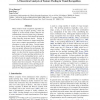Free Online Productivity Tools
i2Speak
i2Symbol
i2OCR
iTex2Img
iWeb2Print
iWeb2Shot
i2Type
iPdf2Split
iPdf2Merge
i2Bopomofo
i2Arabic
i2Style
i2Image
i2PDF
iLatex2Rtf
Sci2ools
ICML
2010
IEEE
2010
IEEE
A Theoretical Analysis of Feature Pooling in Visual Recognition
Many modern visual recognition algorithms incorporate a step of spatial `pooling', where the outputs of several nearby feature detectors are combined into a local or global `bag of features', in a way that preserves task-related information while removing irrelevant details. Pooling is used to achieve invariance to image transformations, more compact representations, and better robustness to noise and clutter. Several papers have shown that the details of the pooling operation can greatly influence the performance, but studies have so far been purely empirical. In this paper, we show that the reasons underlying the performance of various pooling methods are obscured by several confounding factors, such as the link between the sample cardinality in a spatial pool and the resolution at which low-level features have been extracted. We provide a detailed theoretical analysis of max pooling and average pooling, and give extensive empirical comparisons for object recognition tasks...
Related Content
| Added | 09 Nov 2010 |
| Updated | 09 Nov 2010 |
| Type | Conference |
| Year | 2010 |
| Where | ICML |
| Authors | Y-Lan Boureau, Jean Ponce, Yann LeCun |
Comments (0)

